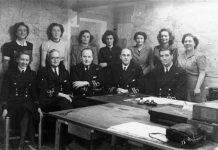Today is Thursday, April 14, the 105th day of 2014. There are 261 days left in the year.
Highlights in history on this date:
1629 – Peace of Susa ends war between England and France.
1775 – The first American society for the abolition of slavery is organized by Benjamin Franklin and Benjamin Rush.
1828 – The first edition of Noah Webster’s “American Dictionary of the English Language” is published.
1834 – Republican uprising in France is crushed by army under Adolphe Thiers.

1849 – Hungarians proclaim independence from Hapsburg empire with Lajos Kossuth as Governor-President. The rebellion is put down by Russian troops in August.
1865 – U.S. President Abraham Lincoln is shot by actor John Wilkes Booth at Ford’s Theater in Washington, D.C., and dies the following morning.
1890 – Delegates to Washington Conference of American States create what is to become the Pan-American Union; that North, South and Central America are all American nations.
1910 – U.S. President William Howard Taft throws the first ball to start the major league baseball season.
1912 – The British liner Titanic collides with an iceberg in the North Atlantic and begins sinking.
1931 – King Alfonso XIII flees after Republicans win elections, and Alcala Zamora becomes president of provisional government.
1939 – John Steinbeck’s novel “The Grapes of Wrath” is published.
1945 – U.S. bombers pound Tokyo and Japan’s Imperial Palace in World War II.
1956 – Ampex Corp. demonstrates its first commercial videotape recorder.
1970 – U.S. Apollo 13 spacecraft heads back to Earth after moon mission that was aborted because of mechanical problems.
1981 – Columbia, America’s first operational space shuttle, lands at Edwards Air Force Base in California after its first test flight.
1987 – Syrian troops deploy at outskirts of Lebanese port city of Sidon — the farthest south they have been since Israeli invasion of Lebanon in 1982.
1988 – Soviet Union signs accord to end its intervention in Afghanistan and to allow Red Army to start troop withdrawal.
1990 – Lithuanian President Vytautas Landsbergis says Lithuania will not revoke its declaration of independence, despite Soviet President Mikhail Gorbachev’s threat of an economic embargo.
1991 – U.S., British and French aircraft drop tons of supplies to Iraqi Kurdish refugees stranded on the Turkish and Iranian borders.
1992 – U.N. warns Iraq it risks military confrontation by moving missiles to Kurdish areas.
1993 – On International Women’s Day, a Chinese newspaper asks 100 women what they would like to be. Sixty say they want to be men.
1994 – Two U.S. fighter planes shoot down two U.S. helicopters in northern Iraq, killing all 26 on board.
1995 – The U.N. Security Council votes to ease sanctions on Iraq, giving it easier terms in trading oil for food.
1996 – Israeli aircraft bombard guerrilla strongholds in Beirut and southern Lebanon, doubling the tide of refugees to 400,000 and provoking guerrilla vows to turn northern Israel into a “fiery hell.”
1997 – Hundreds of Iranian students clash with government troops outside the German Embassy in the first violence since a Berlin court blamed Iran for a 1992 assassination.
1998 – The Irish government frees nine Irish Republican Army prisoners from a top-security prison in the hope of promoting the Northern Ireland peace accord.
1999 – NATO mistakenly bombs a refugee convoy heading out of Kosovo, killing 75 civilians according to Yugoslav sources.
2000 – After years of delay, Russian lawmakers approve the START II treaty to scrap thousands of U.S. and Russian nuclear warheads, clearing the way for further arms reductions.
2002 – A bomb planted under a parked bus in Barranquilla, Colombia, explodes as the motorcade of leading presidential candidate Alvaro Uribe passes. The blast kills three bystanders and injures several others. Uribe later wins the election.
2003 – Indonesian prosecutors indict Abu Bakar Bashir, a 64-year-old radical Islamic cleric, on charges of treason for allegedly plotting to assassinate President Megawati Sukarnoputri and overthrow the government.
2004 – CIA Director George Tenet and FBI Director Robert Mueller go before the Sept. 11 commission and say that enormous intelligence and law enforcement gaps that contributed to the attacks are being filled, but that it will take years more for America to build the needed systems to effectively combat terrorists.
2005 – Afghan farmers challenge President Hamid Karzai’s plans to destroy the world’s largest narcotics industry, vowing to protect their opium crops from an eradication campaign led by U.S.-trained drug police.
2006 – Chad’s president Idriss Deby breaks off relations with neighboring Sudan, threatens to expel 200,000 Darfur refugees and parades more than 250 captured rebels through the streets of the capital after a violent attempt to overthrow him.
2007 – Two brothers strapped with explosives blow themselves up in the middle of a boulevard that runs behind the American Language Center in Casablanca, Morocco, and police arrest another three suspects — including one wearing an explosives belt — hours later.
2008 – Media billionaire Silvio Berlusconi wins a decisive victory in Italy’s parliamentary election, setting the colorful conservative and staunch U.S. ally on course to his third stint as premier.
2009 – Pirates hijack four ships and seize more than 60 hostages off the coast of Somalia just days after the U.S. Navy liberated the abducted American Capt.
Richard Phillips and killed three of the brigands holding him.
2010 – The head of the World Bank says it is time to stop using the term “Third World” to refer to developing countries and recognize they are an essential part of a new, fast evolving international economy.
2011 — Libyan President Moammar Gadhafi rolls defiantly through the streets of Tripoli, pumping his fists as he pokes through the sun roof of an SUV — the same day that NATO airstrikes shake the city.
2012 — Egypt’s election commission disqualifies 10 presidential hopefuls, including Hosni Mubarak’s former spy chief and key Islamists, from running.
2013 — Indonesian investigators begin working to determine what caused a new Lion Air passenger jet to miss a runway while landing on the resort island of Bali, crashing into the sea without causing any fatalities among the 108 on board.
Today’s Birthdays:
Christian Huygens, Dutch mathematician-scientist (1629-1695); John Gielgud, English actor (1904-2000); Rod Steiger, U.S. actor (1925-2002); Loretta Lynn, U.S. country singer (1935–); Julie Christie, British actress (1940–); Brad Garrett, U.S. actor (1960–); Sarah Michelle Gellar, U.S. actress (1977–); Adrien Brody, U.S. actor (1973–); Anthony Michael Hall, U.S. actor (1968–).
Thought For Today:
If the end brings me out all right, what is said against me won’t amount to anything. If the end brings me out wrong, 10 angels swearing I was right would make no difference — Abraham Lincoln (1809-1865).
Copyright 2016 The Associated Press. All rights reserved. This material may not be published, broadcast, rewritten or redistributed.




